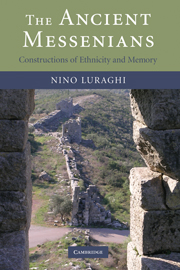Book contents
- Frontmatter
- Contents
- Acknowledgments
- List of abbreviations
- List of illustrations
- Chapter 1 Introduction
- Chapter 2 Delimiting the Messenians
- Chapter 3 The return of the Heraclids and the mythical birth of Messenia
- Chapter 4 The conquest of Messenia through the ages
- Chapter 5 Messenia from the Dark Ages to the Peloponnesian War
- Chapter 6 The Western Messenians
- Chapter 7 The earthquake and the revolt: from Ithome to Naupaktos
- Chapter 8 The liberation of Messene
- Chapter 9 Being Messenian from Philip to Augustus
- Chapter 10 Messenians in the Empire
- Chapter 11 Conclusions
- Bibliography
- Index locorum
- Index of inscriptions
- Archaeological sites
- General index
Chapter 10 - Messenians in the Empire
Published online by Cambridge University Press: 22 September 2009
- Frontmatter
- Contents
- Acknowledgments
- List of abbreviations
- List of illustrations
- Chapter 1 Introduction
- Chapter 2 Delimiting the Messenians
- Chapter 3 The return of the Heraclids and the mythical birth of Messenia
- Chapter 4 The conquest of Messenia through the ages
- Chapter 5 Messenia from the Dark Ages to the Peloponnesian War
- Chapter 6 The Western Messenians
- Chapter 7 The earthquake and the revolt: from Ithome to Naupaktos
- Chapter 8 The liberation of Messene
- Chapter 9 Being Messenian from Philip to Augustus
- Chapter 10 Messenians in the Empire
- Chapter 11 Conclusions
- Bibliography
- Index locorum
- Index of inscriptions
- Archaeological sites
- General index
Summary
The end of the civil wars, the advent of the pax Augusta, and the transformation of mainland Greece into the Roman province of Achaea marked an important turning point in the history of the Greeks. Occasional disturbances are documented in certain areas until the Flavian age, but by and large peace enforced by Roman domination became a fact of life. With the loss of political independence, the military role of the polis, which had survived, if in an increasingly curtailed fashion, in the face of the rise of the Hellenistic monarchies and of the Roman conquest, finally came to an end. Even though poleis remained alive as political communities, in various relationships of dependence on Rome but with their own functioning political institutions, one of the main raisons d'être of the polis had disappeared, and with it the main characteristic of the Greek world, internecine conflict. In the first centuries of the Roman Empire, being Athenian, Spartan, Theban, or Messenian could not mean what it used to. Attachment to the patris became just one layer in a tiered identity, at the top of which a unified Hellenic identity, based on shared cultural practices and underpinned by the assumption of a shared genealogy, became increasingly important. In parallel to this process, the ruling elites of Greece, consolidated and stabilized by the Roman domination, came to constitute one of the pools from which the imperial elite was recruited.
- Type
- Chapter
- Information
- The Ancient MesseniansConstructions of Ethnicity and Memory, pp. 292 - 329Publisher: Cambridge University PressPrint publication year: 2008

